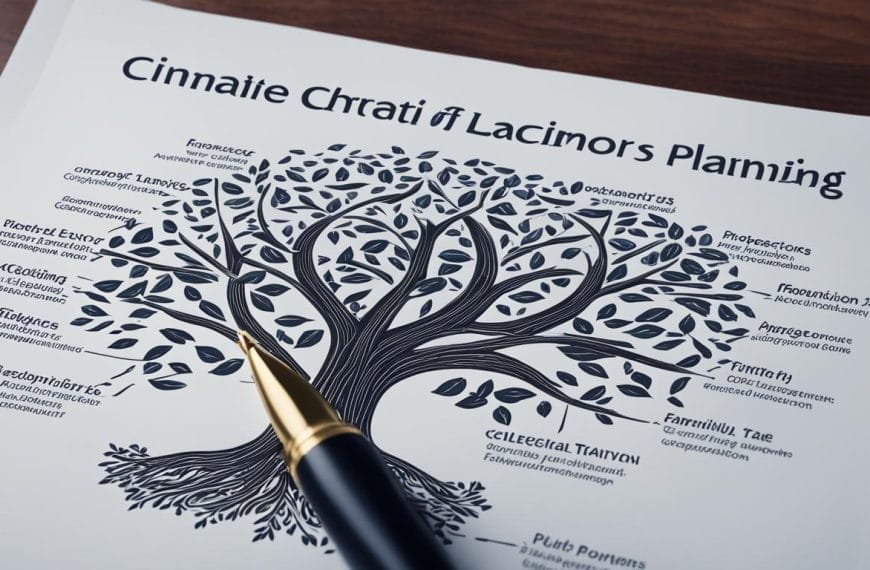When it comes to estate planning, having the right documents in place is crucial for ensuring your wishes are carried out and your loved ones are taken care of. Estate planning goes beyond just creating a will or trust; it involves a comprehensive approach to managing your assets and making important decisions for the future.
Understanding the various estate planning documents is essential for protecting your legacy. From wills and trusts to power of attorney and healthcare directives, each document plays a vital role in securing your financial well-being and ensuring your desires are respected.
In this article, we will explore the must-have estate planning documents, discuss their importance, and explain how they work together to create a comprehensive plan for your future.
The Estate Planning Must-Haves
When it comes to estate planning, there are several essential documents that should be part of your overall strategy. These documents ensure that your wishes are carried out, your assets are protected, and your loved ones are taken care of. Let’s take a closer look at the estate planning must-haves:
1. Will/Trust
A will or trust is the cornerstone of any estate plan. It allows you to specify how you want your assets distributed after your death and ensures that your wishes are legally protected. A will must go through probate court, while a trust allows for a smoother transfer of assets and can potentially minimize estate taxes.
2. Durable Power of Attorney
A durable power of attorney grants someone you trust the authority to make financial decisions on your behalf if you become incapacitated. This document is crucial for ensuring that your financial affairs are managed according to your wishes, even if you are unable to make decisions yourself.
3. Beneficiary Designations
Beneficiary designations are used to determine who will receive your assets that pass outside of a will or trust, such as life insurance policies, retirement accounts, and payable-on-death accounts. By designating beneficiaries, you can bypass probate court and ensure a smooth transfer of these assets directly to your chosen individuals or organizations.
4. Letter of Intent
A letter of intent is a non-legally binding document that provides guidance to your executor or beneficiaries regarding specific preferences, instructions, or intentions. While not a legally-binding document, it can serve as a helpful supplement to your will or trust, providing additional clarity for the distribution of your assets.
5. Healthcare Power of Attorney
A healthcare power of attorney allows you to designate someone to make important medical decisions on your behalf if you are unable to do so. This document ensures that your healthcare preferences are respected and that someone you trust is empowered to make decisions about your medical care.
6. Guardianship Designations
If you have minor children, it’s essential to include guardianship designations in your estate plan. These designations specify who will be responsible for the care and well-being of your children if you pass away. It’s important to choose someone who shares your values and is capable of providing a safe and loving environment for your children.
By including these essential estate planning documents in your overall plan, you can have peace of mind knowing that your wishes will be carried out, your assets will be protected, and your loved ones will be provided for. Now that we’ve covered the must-haves, let’s dive deeper into wills and trusts, two critical components of any estate plan.
| Document | Purpose |
|---|---|
| Will/Trust | Determines asset distribution after death |
| Durable Power of Attorney | Empowers someone to make financial decisions on your behalf |
| Beneficiary Designations | Specifies who receives assets outside of a will or trust |
| Letter of Intent | Provides guidance and instructions to executors or beneficiaries |
| Healthcare Power of Attorney | Designates someone to make medical decisions on your behalf |
| Guardianship Designations | Chooses guardians for minor children |
Now that you have a better understanding of the estate planning must-haves, it’s time to explore wills and trusts in more detail. These documents play a crucial role in determining how your assets are distributed and ensuring that your wishes are carried out. Stay tuned!
Wills and Trusts
When it comes to estate planning, wills and trusts play a crucial role in ensuring that your assets are distributed according to your wishes. Let’s take a closer look at each and how they contribute to a well-rounded estate plan.
Wills
A will is a legal document that outlines how you want your assets to be distributed after your death. It allows you to specify who will inherit your property, money, possessions, and other valuable assets. By having a will in place, you have control over how your estate is handled, ensuring that your beneficiaries receive what you intended for them to have.
Without a will, your estate may go through probate court, where a judge will determine how to distribute your assets based on state laws. This can result in unintended beneficiaries receiving a portion of your estate or even assets being distributed against your wishes. By having a will, you can help prevent these complications and be confident that your estate will be distributed as you desire.
Trusts
Trusts, on the other hand, are a flexible and powerful estate planning tool. A trust is a legal arrangement that allows a third party, known as a trustee, to hold and manage your assets on behalf of your beneficiaries. By creating a trust, you can specify how and when your assets should be distributed to your beneficiaries, providing long-term financial security for your loved ones.
One significant advantage of trusts is that they can help you avoid probate court. Assets held in a trust do not need to go through the probate process, resulting in a more efficient transfer of assets to your beneficiaries. Additionally, trusts can help minimize estate taxes and provide privacy, as the details of your trust will remain private and not become public record.
It’s important to consult with an experienced estate planning attorney to determine which type of trust—such as revocable or irrevocable—best suits your needs and goals.
Choosing a Guardian
Another critical consideration when creating a will is choosing a guardian for any underage children you may have. By naming a guardian in your will, you can ensure that your children are cared for by someone you trust in the event of your untimely passing. This can help prevent potential custody issues and provide you with the peace of mind that your children will be well taken care of.
| Advantages of Wills | Advantages of Trusts |
|---|---|
| Allows you to specify how your assets should be distributed | Helps you avoid probate court |
| Names a guardian for underage children | Offers greater privacy |
| Covers assets held solely in your name | Provides flexibility in managing and distributing assets |
Durable Power of Attorney
A durable power of attorney is a crucial document in estate planning that allows you to appoint an agent to make financial decisions on your behalf if you become unable to do so. This legal instrument ensures that your assets are managed according to your wishes, even if you are incapacitated.
When creating a durable power of attorney, it’s essential to choose someone you trust to act as your agent. This individual should have the knowledge and skills to handle financial matters responsibly. Consider selecting a spouse, family member, or close friend who is financially savvy and shares your values and intentions.
Reciprocal powers of attorney can also be established with your spouse or a financially knowledgeable family member. This arrangement allows each party to act as the other’s agent, ensuring that decisions are made in the best interest of both parties if one becomes incapacitated.
Benefits of a Durable Power of Attorney
The durable power of attorney offers several advantages:
- Asset Management: With a durable power of attorney, your agent can manage your financial affairs, including paying bills, managing investments, and making necessary transactions.
- Protection in Incapacity: If you become mentally or physically incapacitated, the durable power of attorney ensures that your agent can step in and handle your financial matters, avoiding potential financial chaos.
- Preservation of Privacy: By creating a durable power of attorney, you can maintain your financial affairs’ privacy instead of having them subject to court proceedings.
By establishing a durable power of attorney, you can have peace of mind knowing that your financial affairs will be managed according to your wishes, even if you are unable to make decisions for yourself.
| Benefits of a Durable Power of Attorney | Detailed Explanation |
|---|---|
| Asset Management | This legal document allows your chosen agent to manage your financial affairs, including bill payment, investment management, and necessary transactions. |
| Protection in Incapacity | If you become mentally or physically incapacitated, the durable power of attorney ensures that your agent can step in and handle your financial matters, preventing potential financial chaos. |
| Preservation of Privacy | A durable power of attorney helps maintain the privacy of your financial affairs by keeping them out of court proceedings. |
Beneficiary Designations
When it comes to estate planning, it’s important to consider beneficiary designations for certain assets that pass outside of a will. Retirement accounts and life insurance policies are examples of such assets. By naming beneficiaries, you ensure a seamless transfer of these assets directly to your chosen individuals or organizations, without involving probate court.
Updating and maintaining these designations is crucial to ensure that your wishes are properly executed. Additionally, it is important to ensure that the named beneficiaries are over the age of 21 and mentally competent.
Why Beneficiary Designations Matter
Beneficiary designations offer several advantages:
- Probate Avoidance: By bypassing probate court, the transfer of assets to beneficiaries is often faster and more efficient.
- Privacy: Probate proceedings are typically public, while beneficiary designations can help keep asset transfers private.
- Potential Tax Savings: In some cases, proper beneficiary designations may help reduce estate taxes.
| Assets | Beneficiary Designations |
|---|---|
| Retirement Accounts (401(k), IRA) | Designate beneficiaries directly with the account provider |
| Life Insurance Policies | Name beneficiaries on the policy documents |
By utilizing beneficiary designations wisely, you can ensure a smoother transfer of assets and potentially save your beneficiaries from the burdens of probate court proceedings.
Letter of Intent
A letter of intent is a valuable document that allows you to communicate your wishes and instructions to your executor or beneficiaries regarding specific assets or requests after your death or incapacitation. Although not legally binding, it can provide guidance to a probate judge in understanding your intentions and aid in ensuring the proper distribution of your assets, especially if your will is deemed invalid.
The letter of intent is an opportunity to express your desires and wishes in detail. It can include instructions on how you want certain assets to be distributed, personal messages or sentiments for loved ones, and any specific requests or preferences you may have. While the executor of your estate has the legal authority, a letter of intent helps them better carry out your wishes, ensuring a smoother transition of assets based on your personal wishes and instructions.
One key advantage of a letter of intent is that it can clarify any ambiguities or conflicts within your will, providing additional guidance to protect your interests and ensure that your assets are distributed as you intend. It can address any unique circumstances or considerations that may not be adequately covered in a standard legal document. By supplementing your will or trust with a letter of intent, you can provide additional clarity and insight into your decision-making process.
Example Letter of Intent
| Asset | Instructions or Intentions |
|---|---|
| Real Estate Properties | I intend for my primary residence to be sold and the proceeds evenly distributed among my children. |
| Financial Accounts | All financial account information has been consolidated in a separate document titled “Financial Account Details” and should be referenced for proper distribution. |
| Family Heirlooms | I request that the family heirlooms, including the antique jewelry and the grandfather clock, be passed on to my eldest daughter, Jane Doe, who has shown a deep appreciation for our family history. |
| Charitable Contributions | I have earmarked a portion of my estate to be donated to the Animal Rescue Fund, an organization that has always been dear to my heart. I believe in their mission to protect and care for our furry friends in need. |
Healthcare Power of Attorney
Healthcare power of attorney is a crucial component of your estate planning. It allows you to designate someone you trust to make important healthcare decisions on your behalf if you become unable to do so. This document ensures that your healthcare preferences and wishes are respected and followed, even if you are incapacitated or unable to communicate.
When choosing a healthcare power of attorney agent, it’s essential to select a trusted individual who understands your values and beliefs regarding medical treatments and interventions. This person will act as your advocate in medical decision-making, making choices that align with your wishes and best interests.
It’s also important to consider selecting a backup agent in case your primary agent is unavailable or unable to fulfill their duties. This ensures that there is always someone available to make healthcare decisions on your behalf, guaranteeing continuity and consistency in the decision-making process.
Having a healthcare power of attorney in place provides you with peace of mind, knowing that your healthcare decisions will be made by someone you trust and who understands your preferences. It allows you to maintain control over your medical treatment, even when you are unable to actively participate in the decision-making process.
Below is an example table illustrating the role of the healthcare power of attorney agent and the importance of choosing a backup agent:
| Healthcare Power of Attorney Agent | Backup Agent |
|---|---|
| Represents your healthcare preferences and decisions | Steps in if the primary agent is unavailable |
| Advocate for your medical treatment choices | Ensures continuity in decision-making |
| Makes healthcare decisions based on your stated preferences and medical circumstances | Fulfills the role if the primary agent is unable to fulfill their duties |
Remember to regularly review and update your healthcare power of attorney documents to ensure they reflect your current wishes and to make any necessary changes to your agent and backup agent designations.
Conclusion
Estate planning is a crucial process that everyone should prioritize, regardless of their financial status. By creating essential documents such as wills, trusts, power of attorney, and healthcare directives, you can ensure that your wishes are respected and your assets are properly managed.
Through estate planning, you provide peace of mind for yourself and your loved ones. You can rest easy knowing that your assets will be distributed according to your desires, and that someone you trust will be empowered to make financial and healthcare decisions on your behalf if you become unable to do so yourself.
Take the time to plan your estate, and seek professional guidance if needed, to ensure that your estate plan is comprehensive and tailored to your unique circumstances. By doing so, you can protect your assets, minimize potential disputes, and secure a better future for your family.













